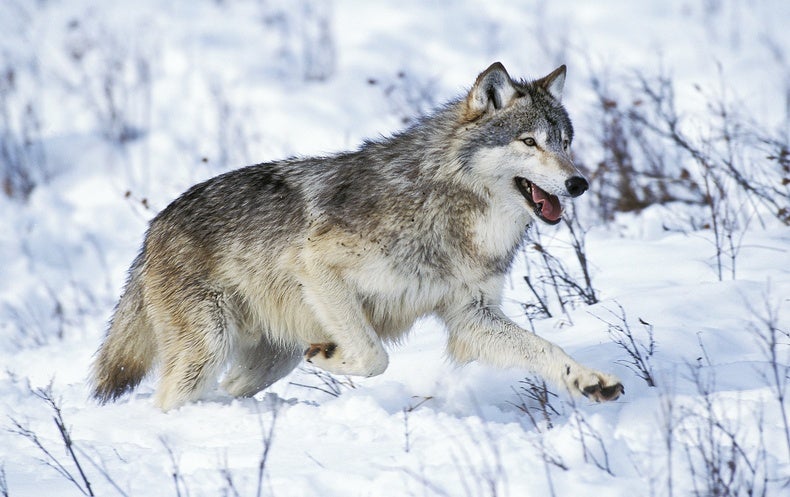Wolves infected with the parasite Toxoplasma gondii are far more likely to become pack leaders than uninfected wolves and are also more likely to disperse from the pack they’re born into, a study published November 24 in Communications Biology reports. The finding points to a possible connection between the infamous parasite and wolf population health.
Toxoplasma gondii (T. gondii) is a “mind control” parasite that can infect any warm-blooded animal, the paper states. The protozoan can only reproduce sexually in the guts of cats, and often spreads through contact with infected feline feces. Infection with T. gondii causes hosts to accrue permanent brain cysts and also induces toxoplasmosis, a disease that can embolden some host species, causing infected animals to seek out more situations in which they can transmit the parasite. Mice infected with T. gondii lose their fear of cat urine, for example, making them more likely to be killed and eaten by a cat, enabling the parasite to reproduce once again. Studies on hyenas have found that cubs infected with T. gondii are more likely to venture out to areas where they could be killed by lions. T. gondii also persists in as much as one third of the human population, Nature reports, but the implications of these often-asymptomatic infections are not entirely understood.
See “Animal Mind Control”
Researchers at the University of Montana wanted to examine whether T. gondii induced risk-taking behavior in gray wolves (Canis lupus) in Yellowstone National Park. Yellowstone wolves overlap spatially with T. gondii-carrying cougars (Puma concolor), and cases of T. gondii infection in wolves have been documented before, the researchers write in their study. They analyzed existing blood samples collected over more than two decades from 229 Yellowstone wolves and 62 cougars, to examine when and whether they were infected with T. gondii. They also examined pre-existing data gathered over those two decades on the locations of members of both species, as well as the wolves’ age, sex, social status, and classification (whether they were in a pack) at each sampling point. Wolves that went into areas with more cougars were more likely to contract the disease, the researchers found. Not only that, but they determined that wolves with toxoplasmosis were 46 times more likely to become pack leaders, perhaps because of the increased boldness commonly associated with the disease.
“We got that result and we just open-mouth stared at each other,” University of Montana wildlife ecologist and study coauthor Connor Meyer tells Nature. “This is way bigger than we thought it would be.”
Infected wolves were also 11 times more likely to disperse from their birth packs, and dispersed at a younger age. Male wolves positive for T. gondii had a 50 percent chance of dispersing within six months of first being monitored by the park, which according to the paper usually begins around six months after the wolf is born. Typically the 50 percent dispersal rate for males would be reached 21 months into monitoring. T. gondii-positive females had a 25 percent probability of dispersing after 30 months, when typically they would reach that probability at 48 months after the start of monitoring.
See “Large Carnivores Under Siege”
The study is one of the few that examine the effects of T. gondii in the wild, Science reports.
“The findings probably represent the tip of the iceberg concerning the parasite’s significance to the dynamics of wild ecosystems,” Eben Gering, a biologist at Nova Southeastern University who was not involved in the work, tells the magazine.
The dangers of toxoplasmosis in wolves likely outweigh any potential benefits, Kira Cassidy, a study coauthor and wildlife ecologist with the Yellowstone Wolf Project, tells Science. Wolves that leave their pack behind may be more likely to leave the safety of the park or get hit by oncoming vehicles, for example. Cassidy adds that toxoplasmosis infection can complicate pregnancies, so pack leaders with toxoplasmosis could be jeopardizing reproduction by spreading the pathogen through mating. Moreover, the authors write in the study that it’s possible T. gondii-infected pack leaders could be leading their packs into more risky territory, increasing their encounters with cougars. Meyer tells Science that the wolves are likely a “dead end” host; cougars almost never eat wolves, so T. gondii has no way of finding a new host to reproduce in. However, he posits that the parasite’s effect on wolves, which are a keystone species, could nonetheless be shaping Yellowstone’s ecosystem.
“Parasites might have a much larger role than anyone generally gives them credit for,” Meyer tells Nature.














